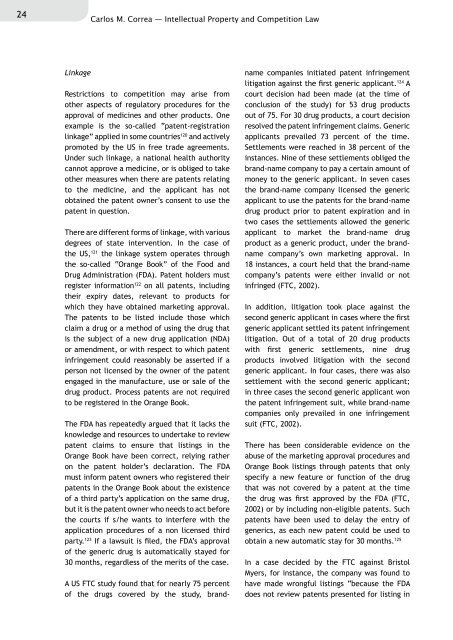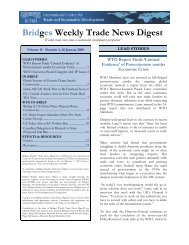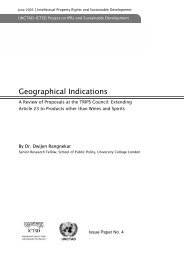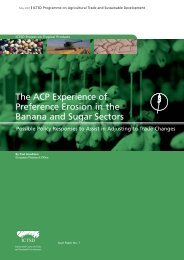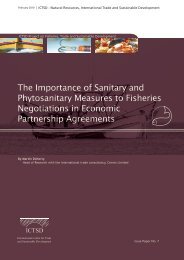Intellectual Property and Competition Law - IPRsonline.org
Intellectual Property and Competition Law - IPRsonline.org
Intellectual Property and Competition Law - IPRsonline.org
You also want an ePaper? Increase the reach of your titles
YUMPU automatically turns print PDFs into web optimized ePapers that Google loves.
24Carlos M. Correa — <strong>Intellectual</strong> <strong>Property</strong> <strong>and</strong> <strong>Competition</strong> <strong>Law</strong>LinkageRestrictions to competition may arise fromother aspects of regulatory procedures for theapproval of medicines <strong>and</strong> other products. Oneexample is the so-called “patent-registrationlinkage” applied in some countries 120 <strong>and</strong> activelypromoted by the US in free trade agreements.Under such linkage, a national health authoritycannot approve a medicine, or is obliged to takeother measures when there are patents relatingto the medicine, <strong>and</strong> the applicant has notobtained the patent owner’s consent to use thepatent in question.There are different forms of linkage, with variousdegrees of state intervention. In the case ofthe US, 121 the linkage system operates throughthe so-called “Orange Book” of the Food <strong>and</strong>Drug Administration (FDA). Patent holders mustregister information 122 on all patents, includingtheir expiry dates, relevant to products forwhich they have obtained marketing approval.The patents to be listed include those whichclaim a drug or a method of using the drug thatis the subject of a new drug application (NDA)or amendment, or with respect to which patentinfringement could reasonably be asserted if aperson not licensed by the owner of the patentengaged in the manufacture, use or sale of thedrug product. Process patents are not requiredto be registered in the Orange Book.The FDA has repeatedly argued that it lacks theknowledge <strong>and</strong> resources to undertake to reviewpatent claims to ensure that listings in theOrange Book have been correct, relying ratheron the patent holder’s declaration. The FDAmust inform patent owners who registered theirpatents in the Orange Book about the existenceof a third party’s application on the same drug,but it is the patent owner who needs to act beforethe courts if s/he wants to interfere with theapplication procedures of a non licensed thirdparty. 123 If a lawsuit is filed, the FDA’s approvalof the generic drug is automatically stayed for30 months, regardless of the merits of the case.A US FTC study found that for nearly 75 percentof the drugs covered by the study, br<strong>and</strong>namecompanies initiated patent infringementlitigation against the first generic applicant. 124 Acourt decision had been made (at the time ofconclusion of the study) for 53 drug productsout of 75. For 30 drug products, a court decisionresolved the patent infringement claims. Genericapplicants prevailed 73 percent of the time.Settlements were reached in 38 percent of theinstances. Nine of these settlements obliged thebr<strong>and</strong>-name company to pay a certain amount ofmoney to the generic applicant. In seven casesthe br<strong>and</strong>-name company licensed the genericapplicant to use the patents for the br<strong>and</strong>-namedrug product prior to patent expiration <strong>and</strong> intwo cases the settlements allowed the genericapplicant to market the br<strong>and</strong>-name drugproduct as a generic product, under the br<strong>and</strong>namecompany’s own marketing approval. In18 instances, a court held that the br<strong>and</strong>-namecompany’s patents were either invalid or notinfringed (FTC, 2002).In addition, litigation took place against thesecond generic applicant in cases where the firstgeneric applicant settled its patent infringementlitigation. Out of a total of 20 drug productswith first generic settlements, nine drugproducts involved litigation with the secondgeneric applicant. In four cases, there was alsosettlement with the second generic applicant;in three cases the second generic applicant wonthe patent infringement suit, while br<strong>and</strong>-namecompanies only prevailed in one infringementsuit (FTC, 2002).There has been considerable evidence on theabuse of the marketing approval procedures <strong>and</strong>Orange Book listings through patents that onlyspecify a new feature or function of the drugthat was not covered by a patent at the timethe drug was first approved by the FDA (FTC,2002) or by including non-eligible patents. Suchpatents have been used to delay the entry ofgenerics, as each new patent could be used toobtain a new automatic stay for 30 months. 125In a case decided by the FTC against BristolMyers, for instance, the company was found tohave made wrongful listings “because the FDAdoes not review patents presented for listing in


